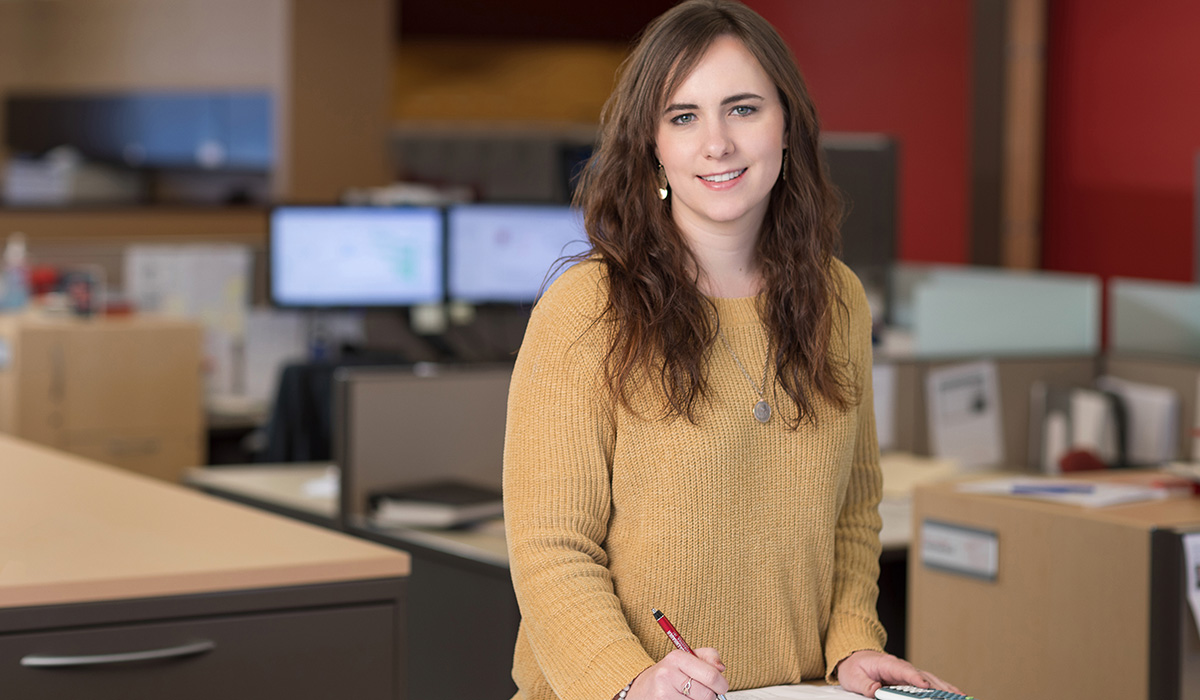Each year around this time, National Engineers Week is observed to bring attention to the contributions made by engineers.
It’s also an opportunity to help promote a strong future workforce by increasing understanding of and interest in engineering careers.
We caught up with Sidney Smith, a mechanical engineer at Sioux Falls-based TSP Inc., a multidisciplinary architectural, engineering, and planning firm. TSP has employed in-house mechanical, electrical, and structural engineers since the 1950s.
Smith earned a bachelor’s degree in engineering from South Dakota State University. She leads TSP’s Innovation Team, an internal group that meets regularly to consider fresh and innovative approaches to work and culture at TSP. She also serves on the board of the South Dakota chapter of the American Society of Heating, Refrigerating, and Air Conditioning Engineers (ASHRAE).
Smith describes her decision to pursue a career in engineering and her current role at TSP.
What was the path that led you to your field?
I really enjoyed math in high school, but I didn’t want to become a teacher and wanted to explore other career paths. I originally declared a civil engineering major before my first year at SDSU. At the time, students received a book that listed all of the courses required for your major. I found the mechanical engineering course descriptions more interesting, changed a few classes before the start of my first year, and was a mechanical engineering major from the start.
What does a “typical” day or week involve for you?
A lot it is designing on the computer – we use a computer program to do our designing, but the process also includes a lot of collaboration within the design group for that project. I’m always talking to the architect, or the electrical engineer, or the structural engineer just to make sure everything will fit and work as it’s supposed to, meet the needs of the client, and meet the architect’s vision.
What brought you to TSP, and what’s kept you there?
At SDSU I interned at a lot of manufacturing facilities, but I wanted to pursue a different career path. I enjoyed my mechanical engineering classes that dealt with creating and moving energy, which led me to consider careers with an energy focus. When I interviewed at TSP and heard about HVAC work, I was interested in working here. The work is interesting and diverse. I’ve been working here for seven years, but I’m still learning things every day about how to do design better. New HVAC technologies are introduced all the time.
The environment at TSP is really nice because I can just walk over or connect quickly with team members to discuss projects instead of calling them, hoping they’re not in a meeting, and then trying to describe things over the phone. It’s nice to have people in-house and on the same systems because you’ve established relationships with your co-workers rather than someone outside TSP where maybe you don’t have that relationship there.
Is there a project or two you’re particularly proud to have worked on and why?
The Midco Aquatic Center. You don’t get to do indoor swimming buildings a lot, and HVAC-wise they bring along a new set of challenges. More design work goes into a pool building than the typical school or office building. It was one of my first major projects working at TSP, and it was also such a major project for the city of Sioux Falls.
Are there some misconceptions you think people might have about the role of an engineer?
That we sit at a desk all day, by ourselves designing, and never talk to anyone else. I talk to people all the time: team members within TSP, contractors that we work with, owners, other mechanical engineers, and sales representatives.
For all those groups, there’s a different level of knowledge of mechanical engineering and HVAC. It’s important to modify how information is presented.
What would you tell a young person (or parent of a young person) considering a career in this field?
Engineering takes all types. I’ve gone to school with people who are very book smart. They are very good at equations and math, but if you asked them to build anything, they wouldn’t know how. I have also seen the opposite, where people go into engineering to focus on building, but they struggle at the book part of it. It takes both types. You’re going to need to get through both aspects, but if you’re not excelling in one of those areas, don’t give up.
What do you enjoy doing when you’re not at work?
I spend a lot of time with family and friends. In the summer we enjoy camping and swimming. I’ve been trying to get into gardening.
